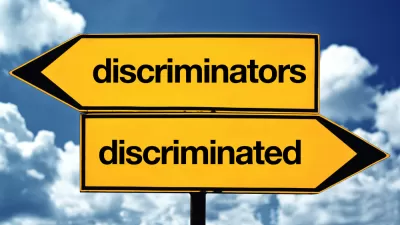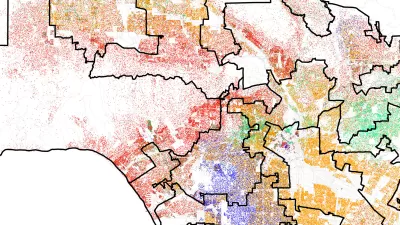A study utilizing simulations of more than 20 million virtual “neighborhoods” finds a negative relationship between cohesion and diversity. The findings could alter how we understand and build social capital within neighborhoods and across cities.
Richard Florida looks at a new study, “The (In)compatibility of Diversity and Sense of Community” [PDF], published in the November edition of the American Journal of Community Psychology that found a "troubling paradox" using agent-based modeling: "community and diversity may be fundamentally incompatible goals."
Seeking to find a silver lining to these "sobering" findings, Florida asks sociologist Zachary Neal, one of the study's authors: "If diversity is unattainable at the neighborhood level, might it be possible at the level of the city, as essentially a network of more or less similar neighborhoods?"
"We usually view segregation as problematic, but when it comes in the form of a patchwork of neighborhoods and enclaves that each have their own character, it may actually ‘work,’” says Neal.
"For this reason, urbanists and local policy makers might be better off refocusing their efforts away from the unachievable ideal of diverse and cohesive neighborhoods and toward creating cohesion across the various neighborhoods that make up a city," posits Florida.
FULL STORY: The Paradox of Diverse Communities

Planetizen Federal Action Tracker
A weekly monitor of how Trump’s orders and actions are impacting planners and planning in America.

Restaurant Patios Were a Pandemic Win — Why Were They so Hard to Keep?
Social distancing requirements and changes in travel patterns prompted cities to pilot new uses for street and sidewalk space. Then it got complicated.

Maui's Vacation Rental Debate Turns Ugly
Verbal attacks, misinformation campaigns and fistfights plague a high-stakes debate to convert thousands of vacation rentals into long-term housing.

Boulder Eliminates Parking Minimums Citywide
Officials estimate the cost of building a single underground parking space at up to $100,000.

Orange County, Florida Adopts Largest US “Sprawl Repair” Code
The ‘Orange Code’ seeks to rectify decades of sprawl-inducing, car-oriented development.

Maui's Vacation Rental Debate Turns Ugly
Verbal attacks, misinformation campaigns and fistfights plague a high-stakes debate to convert thousands of vacation rentals into long-term housing.
Urban Design for Planners 1: Software Tools
This six-course series explores essential urban design concepts using open source software and equips planners with the tools they need to participate fully in the urban design process.
Planning for Universal Design
Learn the tools for implementing Universal Design in planning regulations.
Heyer Gruel & Associates PA
JM Goldson LLC
Custer County Colorado
City of Camden Redevelopment Agency
City of Astoria
Transportation Research & Education Center (TREC) at Portland State University
Camden Redevelopment Agency
City of Claremont
Municipality of Princeton (NJ)





























